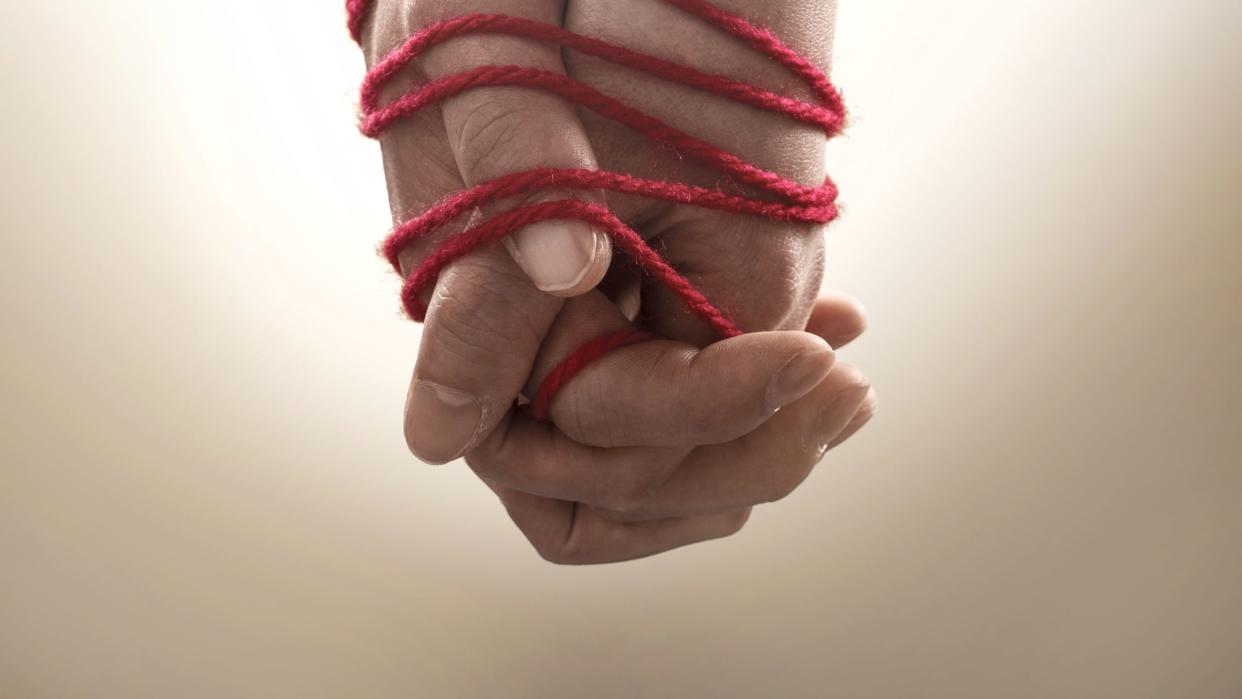Isn’t Every Relationship Kind of Codependent?

“You’re codependent.” It’s an accusation many of us have heard when we prioritize the needs of others over our own. The offense may be as simple as saying you want to wait to see what your spouse orders, in case you want to split entrées, or leaving a party early because your partner or best friend isn’t in the mood. You think you’re being sensitive to someone else’s needs at a specific moment, but the finger-pointer is implying that you constantly tamp down your own desires to build up your partner and keep the peace.
The term codependent gets bandied around so much, it’s enough to make you wonder when considering another person’s feelings turned into a bad thing. Aren’t we all influenced by the moods and desires of the people we love? Isn’t picking up on those moods called…empathy?
Turns out, the difference between empathy and codependency is a question of degree. “Taking care of other people and being concerned with their well-being is obviously a good thing,” says Sharon Martin, a psychotherapist and author of The Better Boundaries Guided Journal. “It becomes a bad thing for us, and for the relationship, and for the other person, when that becomes the priority above and beyond taking care of our needs—because that’s not sustainable.”
We’ve all met—or been—the person who has worn themselves down with anxiety in trying to control the actions or mood of some other, often volatile person. But the diagnosis du jour wielded by today’s armchair psychiatrists was practically unheard of before 1986, when Melody Beattie wrote the book Codependent No More. When she popularized the term, she says, “I was working in a treatment center with families who were distressed over the alcoholism and addiction of a beloved family member.” The people she met kept trying to control the difficult and erratic situation they were in, as well as the behavior of the addict—an understandable desire, but an impossible task.
“What we’ve discovered is that the same phenomenon happens in relationships where there isn’t addiction,” says Martin. “Sometimes the partner has another form of dysfunction, or they don’t care about their partner’s needs; they’re engrossed in their own stuff.” Either way, an off-kilter dynamic takes hold.
Other times, it’s the person with the codependent tendencies—the impulse to cater to others’ needs or constantly recalibrate their own behavior to appease others—creating the imbalance. “Codependents can be controlling because there is an element of thinking that they know how to fix everything, and that they should,” says Martin, adding that “if they are currently in, or have been in, situations where there’s a lot of chaos, controlling [things] can be a way to feel some sense of emotional safety.”
Another key fact: You don’t have to be in a relationship to be codependent. If it’s ingrained in your psyche to ignore your needs and control all the variables in a situation to “manage” the volatile people around you, it can impact how you relate to anybody. (Maybe a difficult boss or parent comes to mind?) And no matter how competent or superhuman you may be, that’s a lot of pressure to put on yourself.
“It’s not our job to manage any human being other than ourselves and the people we’re responsible for. Younger children, people growing up, and the elderly—they need help,” Beattie points out. “But in the extreme, we can tend to put ourselves in charge of everyone’s life, which is unpleasant for everyone. It starts out honorable and ends up being just awful.”
If all of this hits close to home, here are a few ways to shift your behavior: Practice listening to your inner voice (Beattie recommends meditating daily to quiet outside noise), setting boundaries, and clearly and firmly communicating your needs to others, instead of expecting the people in your life to intuit, or ignore, them.
When both partners can do that, they can find themselves in a relationship waltz that’s the opposite of codependency. “Being attuned to your partner’s needs, wanting to offer support and take care of them when they’re having a hard time, that’s not necessarily bad or codependent,” she explains. “If you’ve got a healthy give-and-take, if you’re both doing it for each other, it can be interdependency.”
Now that’s a word—and a state of being!—we’d like to see more of.
You Might Also Like
